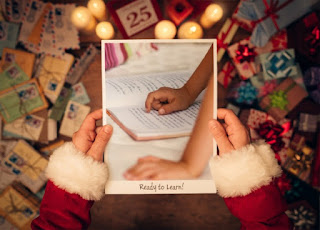Baby was Born to Learn
In some ways the belief that babies are born as blank slates may be true, but related ideas have been shown false. One example is the claim that children are born atheist; it's the default position. That is simply an opinion with no empirical data to support it. In fact, the opposite is true, and is one reason that evolutionary indoctrination in schools is accelerated!
Further, it has been shown that young'uns are born with a proclivity for reading. Although amazing, it may be less surprising that children are born ready to learn.
 |
| Baby with Book, Unsplash / Lavi Perchik, modified at PhotoFunia |
How do we learn? The answer is as simple as it is profound: “No surprise, no learning: this basic rule now seems to have been validated in all kinds of organisms—including young children.” So says leading French cognitive neuroscientist Stanislas Dehaene in his intriguing new book, How We Learn: The New Science of Education and the Brain. . . .Did you know that, “Right at birth, babies can tell the difference between most vowels and consonants in every language in the world”? (p. 65). In addition to this, “babies already prefer listening to their native language rather than to a foreign one—a truly extraordinary finding which implies that language learning starts in utero [in the womb]” (p. 64). In fact, rather than starting off as a tabula rasa (blank slate), a baby’s brain is ready to investigate and interact with the world, like a “true Sherlock Holmes in diapers” (p. 61).
To read the full article, see "Babies are born ready to learn."